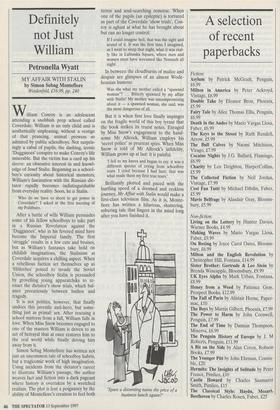Definitely not Just William
Petronella Wyatt
MY AFFAIR WITH STALIN by Simon Sebag Montefiore Weidenfeld, £16.99, pp. 240 William Conroy is an adolescent attending a snobbish prep school called Coverdale. William is an only child and is aesthetically unpleasing, without a vestige of that prancing, animal prowess so admired by public schoolboys. Not surpris- ingly a cabal of pupils, the dashing, iconic `Dugganoes' conspire to make Conroy's life miserable. But the victim has a card up his sleeve: an obsessive interest in and knowl- edge of Josef Stalin. Beginning as a school- boy's curiosity about historical monsters, William's fascination with the Russian dic- tator rapidly becomes indistinguishable from everyday reality. Soon, he is Stalin.
Who do we have to shoot to get power in Coverdale?' I asked at the first meeting of my Politburo.
After a battle of wills William persuades some of his fellow schoolboys to take part in a Russian Revolution against the tougganoes', who in his fevered mind have become the Imperial family. The first `struggle' results in a few cuts and bruises, but as William's fantasies take hold on childish imaginations, the Stalinism at Coverdale acquires a chilling aspect. When a rebellious faction set themselves up as Ilitlerites' poised to invade the Soviet Union, the schoolboy Stalin is persuaded by grovelling young apparatchiks to re- enact the dictator's show trials, which bal- ance precariously between bathos and tragedy.
It is not politics, however, that finally undoes this juvenile anti-hero, but some- thing just as primal: sex. After rescuing a school mistress from a fall, William falls in love. When Miss Snow becomes engaged to one of the masters William is driven to an act of betrayal that at once restores him to the real world while finally driving him away from it.
Simon Sebag Montefiore has written not just an uncommon tale of schoolboy hubris, but a tragicomic work of high imagination. Using incidents from the dictator's career to illustrate William's passage, the author weaves fact and fiction into a dark pageant where history is overtaken by a wretched realism. The plot is lent a poignancy by the ability of Montefiore's creation to feel both terror and soul-searching remorse. When one of the pupils (an epileptic) is tortured as part of the Coverdale 'show trials', Con- roy is aghast at what he has brought about but can no longer control:
If I could imagine hell, that was the sight and sound of it. It was the first time I imagined, as I went to sleep that night, what it was real- ly like in Lubianka Square, where men and women must have screamed like Nonsuch all night.
In between the cloudbursts of malice and despair are glimpses of an almost Wode- housian humour.
Was she what my mother called a "spawned woman"? ... Bitterly spawned by my affair with Stalin! My mother was uncompromising about it — a spawned woman, she said, was the most dangerous of all.
But it is when first love finally impinges on the fragile world of this boy tyrant that the book strikes its truest notes. Enraged by Miss Snow's engagement to the hand- some Mr Allcock, William employs his `secret police' as prurient spies. When Miss Snow is told of Mr Allcock's infidelity, William grows up at last: it is painful.
'I fell to my knees and began to cry: it was a different species of crying from schoolboy tears. I cried because I had hurt: that was what made them my first true tears.'
Brilliantly plotted and paced with the hurtling speed of a doomed and reckless journey, My Affair with Stalin would make a first-class television film. As it is, Monte- fibre has written a hilarious, shattering, sobering tale that lingers in the mind long after you have finished it.
`Spare a dissenting name the price of a business lunch squire?'


































































 Previous page
Previous page